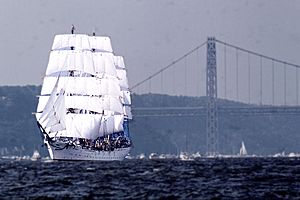Square rig facts for kids
A square rig is a special way to set up the sails on a ship. Imagine big, rectangular sails hanging from horizontal poles called yards. These yards are attached to tall poles called masts. When a ship has square sails on all its masts, it's called a full-rigged ship.
Contents
What is a Square Rig?
A square rig means that a ship's sails are mostly square or rectangular. These sails are attached to horizontal poles called yards. The yards are then connected to the ship's tall, upright poles, which are called masts. The way these sails and yards are arranged helps tell different types of square-rigged ships apart.
How Square Rigs Work
Square sails are very good at catching the wind when it blows from behind the ship. This is especially helpful in areas with steady winds, like the trade winds found in many parts of the world's oceans. In these conditions, square-rigged ships can travel very fast.
However, square rigs can be tricky to handle when the ship needs to change direction sharply, a move called tacking or "coming about." This is because the large square sails don't work as well when the wind is coming from the side or front of the ship. Sailors need to be very skilled to manage all the ropes and sails to turn the ship.
Types of Square-Rigged Ships
- Full-rigged ship: This is the classic example of a square-rigged ship. It has square sails on all its masts. Most full-rigged ships have three or more masts.
- Brig: A brig is a two-masted ship where both masts have square sails.
- Barque: A barque usually has three or more masts. The front masts have square sails, but the very last mast has a different type of sail called a fore-and-aft sail.
Images for kids
-
Main-mast of a square-rigged brig, with all square sails set except the course
-
The Golden Hinde, a square-rigger with several of its lines unshipped, in dry dock in London
See also
 In Spanish: Vela cuadra para niños
In Spanish: Vela cuadra para niños
 | George Robert Carruthers |
 | Patricia Bath |
 | Jan Ernst Matzeliger |
 | Alexander Miles |






